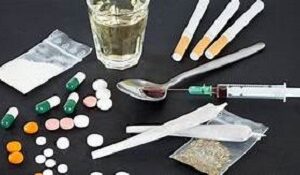There are many things that people with drug use disorders have in common, but there are also many things that set them apart. The indications, symptoms, and consequences of a drug use disorder depend on the amount, frequency, and presence of additional addictive substances being used by the person with the illness. There are a wide variety of drug types, all of which may be dangerous to individuals who misuse them. When a person continues to use drugs or alcohol, he or she is more likely to have difficulties in his or her personal and professional life. Individuals who stop abusing drugs as soon as possible have a better chance of a complete recovery. There is no such thing as a universally safe or effective medicine. According on how they are made, what they include, and how effective they are, certain pharmaceuticals have the potential to be more dangerous than others. The following are some of the most frequent forms of drug abuse:
ABUSE OF STIMULANTS
Substances that speed up physical and mental processes are known as stimulants. Abusing stimulants may lead to a significant increase in energy, exhilaration, and a strong feeling of grandiosity in those who use them often. Even some people with specific mental health conditions may benefit from stimulant medications, many stimulant drugs have little medical or psychological value. Stimulants that are widely misused include:
Amphetamines
Meth
Vyvanse
Concerta
Dexedrine
Ritalin
Cocaine\crack
ABUSE OF COCAINE
Cocaine is a common street drug in the United States, and has been for many years. The white powder form of this coca plant derivative is often inhaled and is available in small amounts. The euphoric high from cocaine abuse lasts for around 20 minutes until it subsides. As a consequence, in order to sustain their high, the majority of cocaine users repeatedly consume the drug. Addiction and overdose are real risks when cocaine is used on a regular basis.
ADDERALL METHOD OF ABUSE
Attention-deficit/hyperactivity disorder (ADHD) is the most common usage of Adderall, a prescription stimulant. As prescribed, Adderall may improve concentration and attention. Abuse of Adderall, on the other hand, results in a long-lasting increase in energy and sharpness of concentration. Excessive use of this prescription medication might result in cardiac problems, including heart attacks.
ABUSE OF METHAMPHETAMINE
Meth, sometimes known as “trash” or “junk,” is a highly addictive stimulant with a pseudoephedrine base as its major active component. Paint thinner, hydrochloric acid, and battery oil are just a handful of the dangerous substances included in methamphetamine. Meth addicts go through cycles of extreme euphoria and depressive lows. Going from ecstatic to despondent may be a roller-coaster ride that might leave you with long-term mental health issues.
ABUSE OF OPIOIDS
There are more than 11 million opioid users in the United States. More and more individuals are getting addicted to their opioid or opioids of choice as the opioid crisis rages on. Even while heroin and codeine, two naturally occurring opioids, are highly addictive, so are more modern synthetic opioids such as fentanyl and OxyContin. Opioid misuse may lead to organ failure, respiratory issues, and even overdose if it is not stopped. Opioid misuse is one of the most common causes of avoidable mortality in the United States, according to a recent study. Suboxone is a drug that may be used to treat the symptoms of physical withdrawal for as little as a few weeks or as long as several months.
ABUSE OF HEROIN
Nearly a million Americans are addicted to heroin, making it the dominant opiate on the market today. A euphoric high is achieved when heroin is abused, resulting in a reduction or elimination of bodily and/or psychological pain. A large number of heroin users had previously used prescription painkillers, but discovered that heroin was simpler to get and more economical. The most common methods of ingesting and smoking heroin are injection and smoking. An increased risk of HIV and hepatitis infection, as well as blocked veins, are possible side effects of injecting this drug.
Some of the most often misused prescription medicines are OxyContin, Vicodin, Percocet, and fentanyl Each of these medications, when used as directed, may be quite beneficial to your health; yet, if abused, they can be lethal. Painkiller addicts are more likely to engage in risky activities including doctor shopping, prescription medication theft from loved ones’ homes, and pill snatching on the streets of their cities of residence. These drugs may be taken orally, smoked, snorted, injected, or swallowed. Because it’s hard to tell exactly what’s in these semi-synthetic opioids, it’s incredibly dangerous to keep abusing them.
THE ABUSE OF SEDATS
Anxiety disorders, including panic attacks, phobias, and obsessive-compulsive disorder, are the primary uses for benzodiazepines. Individuals with anxiety, insomnia, or seizures may benefit from the sedative properties of benzodiazepines. However, because of the sensations of detachment and relaxation they generate, they are very popular drugs of abuse.
XANAX, ATIVAN, AND VALIUM ARE JUST A FEW OPTIONS.
There are three benzodiazepines: Xanax, Ativan, and Valium. The effects of these benzodiazepines are nearly instantaneous for those who take them. Addicts who misuse benzodiazepines like these run the danger of developing drowsiness, somnolence, and even respiratory depression. Withdrawal symptoms, such as grand mal seizures, may be fatal for someone who has grown physically and mentally reliant on one of these prescription medicines and abruptly tries to stop taking it.
HALLUCINOGENS
For a long time, clubbers have relied on hallucinogens to amp up their experiences. Although hallucinogen abuse has several bodily risks, the most serious issue is that someone who is hallucinogen-dependent might act in a way that is potentially harmful or even fatal.
THE USE OF EASY ABUSE
Addicts who consume ecstasy report visual and auditory hallucinations as a side effect of their usage. Ecstasy users describe themselves as in a sense of euphoria when using the drug. However, if this medicine is used in excess, it might cause dehydration that can be life-threatening.




